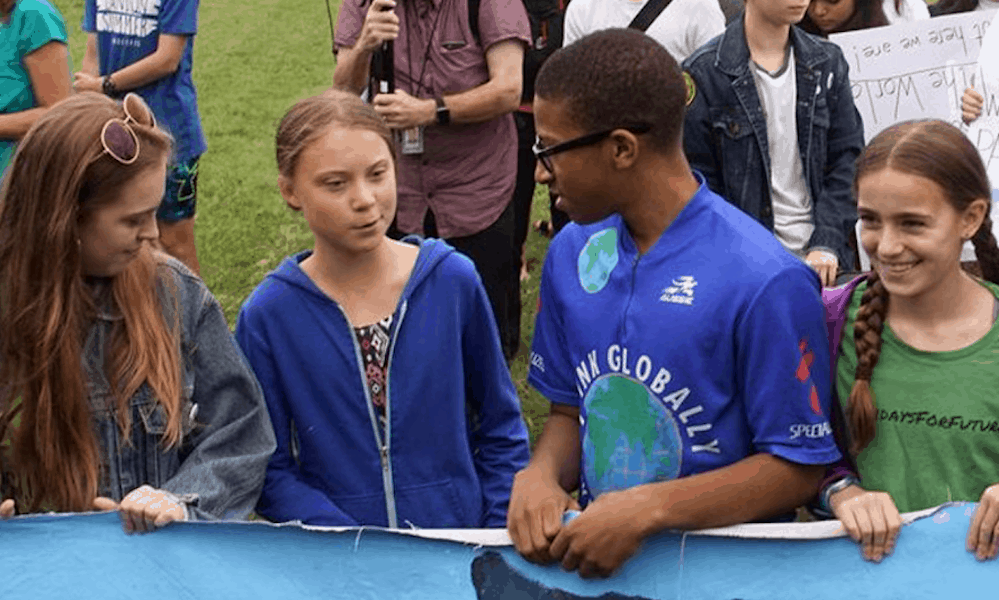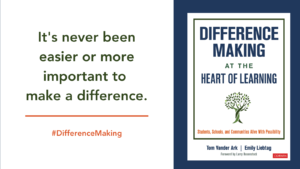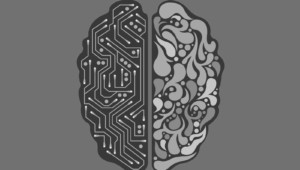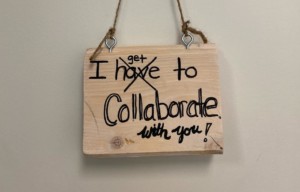Why Difference Making is the New Superpower

Jerome Foster II is the founder and Executive Director of One Million of Us, a campaign to mobilize one million young people to vote in the 2020 election. He spent the last 60 weeks campaigning for climate justice at the White House. “I am advocating for the Climate Change Education Act to pass both the house and the senate,” said Foster (center in the featured image).
He interned with Congressman John Lewis. He participated in protests with Jane Fonda and is a high school senior at Washington Leadership Academy. “He’s an example of what can happen when we empower kids to make a difference,” said WLA Executive Director Stacy Kane.
A daily conversation with an advisory invites WLA students to develop a sense of identity and direction. As freshmen, they ask, “Who am I?” Sophomores dive into college and career options. Juniors explore how they can blend personal and professional interests.
WLA students learn how they can make an impact on the world. They learn to practice social justice. They have a say in the operation of the school. They build campaigns. And they develop leadership skills by serving in internships as juniors.
There are five reasons we need more schools that equip and launch young people into difference-making.
New priorities for a new era. We’re living through a black swan event, an unpredicted shock of global and historic proportions. The problem is that these unprecedented events are occurring regularly. Man-made systems are interacting with the natural world in ways that make the unimaginable a monthly occurrence. Kay and King called it Radical Uncertainty “for which historical data provide no useful guidance to future outcomes.”
Young people are the first generation to be experiencing the impact of dramatic climate change—terrible storms, violent fires, and rising sea levels—and perhaps the last generation with a chance to effect a sustainable change.
We’re living on a set of exponential curves–technology, climate, and pandemic–where the future is coming at us faster than ever. Expecting continued waves of novelty and complexity, Seth Godin has wisely said that young people need to learn two things–leadership and solving interesting problems.
An employer survey by the National Association of Colleges and Employers showed demand for leadership, problem-solving, communication and a big uptick in initiative taking.
Difference making is the new superpower. It’s the agency and awareness to take action when and where needed. It’s the entrepreneurial mindset to spot an opportunity and the design thinking to deliver creative solutions for a community.
The new mutuality. The global pandemic, the mounting climate crisis, and the benefits and threats that come with the rise of artificial intelligence make it clear–we’re all in this together.
A Stanford study showed that many teens do not exhibit beyond-the-self intentions. However, this appears to be a matter of exposure. “When adolescents can find clubs or structured school activities that connect with their broader interests, they are likely to become more personally motivated and engaged in those activities. If we encourage teens to pursuing their beyond-the-self interests, they are also more likely to have a stronger sense of purpose in the world.”
Given an opportunity to engage and reflect, many young people embrace the new mutuality and are eager to contribute to the common good. At schools like One Stone in Boise, “learning has become relevant to students. As agents of their own story, students focus on what is important to them while making meaning out of their learning each day,” said Chad Carlson, the Director of Research and Design.
Over 400 projects were completed by the last cohort at One Stone (lab school and after school programs). Many of them were in service to the community, including parent and teen discussions about alcohol abuse; teaching middle school girls about healthy relationships and behaviors; a campaign to reduce waste from single-use cups; a campaign to fight drinking and driving on graduation night, and taking refugees on outdoor adventures.
Everyone can make a difference. Schools alive with possibility introduce learners to the world and help them identify and develop passion and purpose. At Cajon Valley, elementary and middle school students reflect on strengths, interests, and values after each of 54 career exploration units.
In our research, we spotted two dozen high schools that put difference-making at the heart of the agenda. They determined that making a difference today is not only super motivating, but it is also the best preparation for tomorrow.
The purpose of Crosstown High in Memphis is: “To prepare students to understand and pursue solutions to the challenges faced by our city and world, and to give students the confidence to be agents of positive change now and in the future.”
Nevermore important, never easier. It has never been easier for high school students to make a world of difference–right now, right there they are. Greta Thunberg showed us how social media can amplify a teenager’s voice. Coding tools make it possible to build a mobile application. Commerce platforms make it easy to start a business. Open machine learning tools make it possible to bring big data solutions to neighborhood problems. And access to philanthropic and venture funding has never been more widespread.
With pressing challenges, it makes sense to engage youth in real problems that are important to them and their community. While making a difference, young people are building leadership and problem-solving skills that will serve them for a lifetime. They just need a little encouragement, a little room, and a little support.
For more see:
- Hard Reset: What Will Be New Post Pandemic
- Where Can You Make the Biggest Difference?
- The Case for Contribution: Why Schools Should Empower Difference Making
Stay in-the-know with innovations in learning by signing up for the weekly Smart Update.
This blog was previously posted on Forbes.








0 Comments
Leave a Comment
Your email address will not be published. All fields are required.